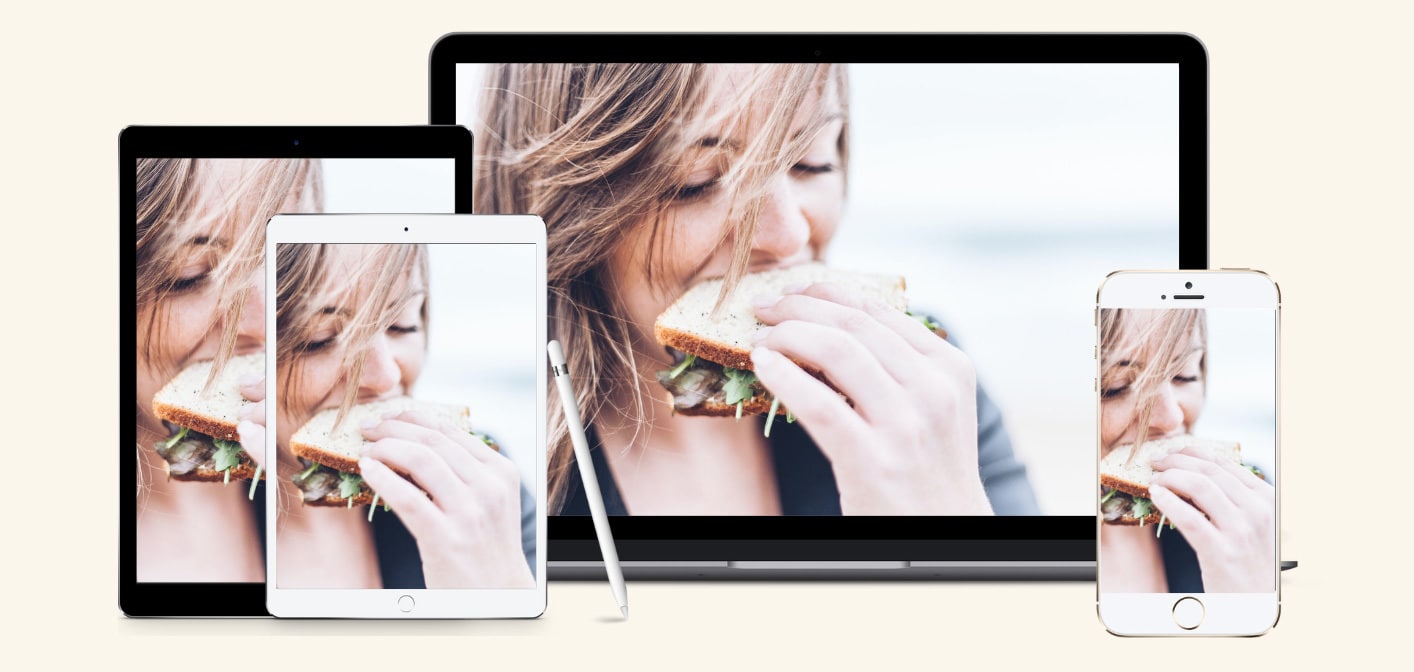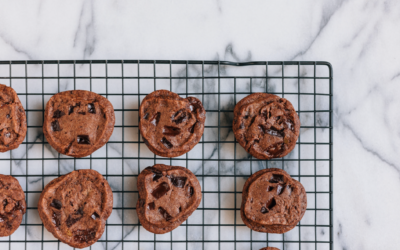Do you find yourself constantly thinking about your next meal or snack and wondering how to stop thinking about food?
“All I think about is food. I don’t know why and can’t even remember when it started. Before I finish most meals I am already thinking about the next. It’s exhausting and I know it’s not normal, but I don’t know why it’s happening”
If this sounds like you, know you are not alone. I am a Registered Dietitian and this experience of thinking about food all the time is something I see often in my clients.
This article is going to explain the most common reasons you may be thinking about food a lot. I will also give my top 5 tips to stop thinking about food – practical ideas you can get started with at home today.
Why you can’t stop thinking about food
There are three main reasons you may not be able to stop thinking about food.
1) You are not eating enough
Research clearly shows that if you are not eating enough, you will think more about food. This could be due to dieting or other restrictive eating practices, or other reasons.
The first research study to show this effect was the Minnesota Starvation Experiment. In this study, 32 young, healthy, male volunteers were put on a semi-starvation diet of 50% of their daily calorie needs, for 6 months. Among the variety of detrimental effects, they experienced on their physical and mental health were unwanted, increased thoughts about food.
This is really relevant when it comes to modern-day diets. For example, many people will go on 1200-1500kcal diets and then wonder why they are thinking about food all the time. It’s because they are essentially starving themselves.
Your body has your back – it’s increasing the amount you think about food in an attempt to motivate you to eat more, so it doesn’t starve!
2) You are not letting yourself eat certain types/groups of foods
Are you trying to not eat certain foods to be healthier or lose weight? Common ones people restrict include carbohydrates, fatty foods, sweets and chocolates. If this sounds like you, it could be making you think more about food, especially about the types of foods you are trying not to have.
Annoying huh?! But that’s just the way our human brains are wired. Research on thought suppression tells us about this. Thought suppression is the act of intentionally trying not to think about something (i.e. a tasty pizza or creamy bar of chocolate). A large body of research indicates that thought suppression is ineffective. Moreover, it can be counterproductive, and actually, induce the very state of mind one had hoped to avoid. Imagine being told, “Don’t think of a pink bear.” This is an example of thought suppression. Give it a try—close your eyes for a minute and try not to think of a pink bear. What did you discover?
So, you see, willing ourselves to not think about “naughty” foods doesn’t work. But there is a way around this, which we will discuss below.
3) Food is your coping mechanism for dealing with discomfort
Is food your main source of soothing and comfort? This is another reason you may not be able to stop thinking about food.
Picture a stressful day at work and a lecture from your boss. Your thoughts immediately turn to get home, raiding the fridge and getting Uber Eats for dinner to make yourself feel better.
If so, this is nothing to be ashamed of. In fact, it’s very normal to sometimes turn to food for comfort. But if food is your main or only way of dealing with uncomfortable feelings, this can be bad for your overall well-being. If this sounds like you, it will be helpful to increase your tolerance for tough emotions and learn other ways to cope with them. More on this later in the article.
Stop Obsessing and Regain Control With Food: Your 7-day Guide
Practical, easy-to-implement tips to feel less obsessive and out-of-control around food.
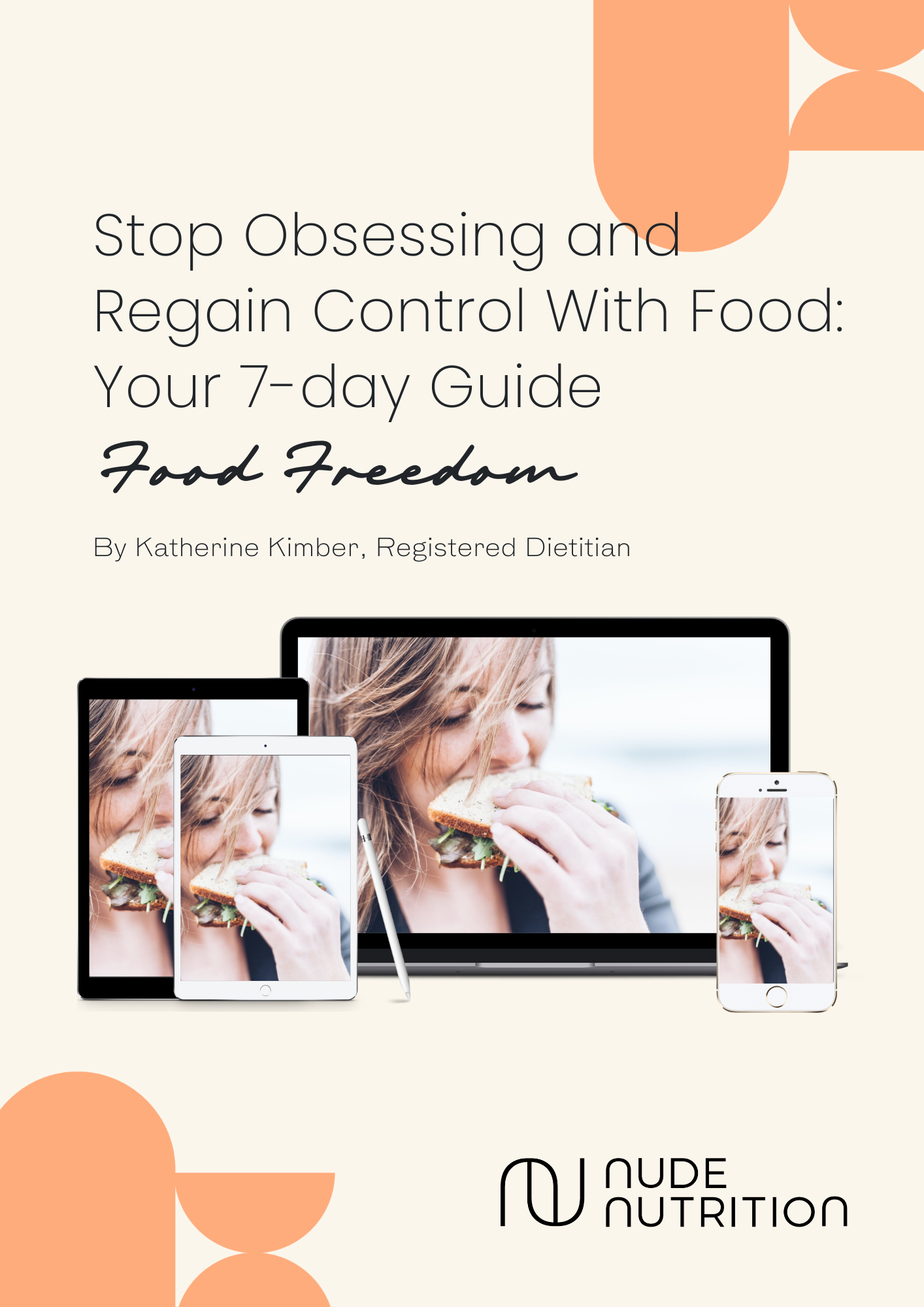
Is always thinking about food a disorder?
The short answer is no, always thinking about food is not a disorder.
However, increased thoughts about food can be a sign of eating disorders such as anorexia nervosa, bulimia nervosa and binge eating disorder.
If you are concerned about your eating habits or relationship to food, this article from BEAT tells you how to approach your doctor about your eating struggles. It is especially important to seek support if you have lost weight and/or are engaging in purging, compensatory exercise, binge eating or laxative abuse. You may be at medical risk.
Speaking to a Registered Dietitian or Therapist who specialises in Disordered eating can help. I run a private practice with a team of Dietitians and a Psychotherapist, to help you navigate healing your relationship with food. You can find out more about that here. and get in touch for a free 20-minute discovery call.
Top 5 Tips to Stop Thinking About Food
1) Get curious and ask yourself these questions
Remove the judgmental voices sitting on your shoulders for 10 minutes so you can get curious with me. It’s important to put aside ideas about what your eating “should” or “should not” look like so you can really tune in and truthfully answer these questions, without judgment.
Why are you eating the way you are?
Is it because it feels good to eat the way you are? Or are you following diet rules and not really paying much attention to how it actually feels?
How are you eating?
Fast, slow, mindfully, distracted in the car?
And where are you eating?
Are there specific foods you’re constantly thinking about? Do you allow yourself to regularly eat these foods?
Taking a curious non-judgmental look might open up some clues for you about what could be going on (and the rest of my tips below should connect the dots).
2) You probably (almost definitely) need to eat more
It might sound counterproductive, by hear me out – especially if you’re constantly thinking about food.
In order to not obsessively think about food, the first checkbox to tick is eating enough food. Whilst myfitnesspal might say it’s enough to eat 1500kcal per day, I am here to tell you it’s almost certainly not enough. If you need help navigating how much food is right for you, get in touch with us today for a free discovery call.
Furthermore, try to eat regularly. In general, to feel your best and avoid energy dips, you don’t want to be going much more than 3-5 hours without food.
3) Put away distractions when eating and eat mindfully
Do you shove lunch down whilst scrolling through your phone? Is dinner usually in front of the TV or distractedly eaten whilst trying to juggle the kids? If this is the case, you may be missing out on the sensory pleasure of eating. The sensory pleasure we derive from eating can help us register fullness and satisfaction. But we have to actually be present enough to experience this. In turn, this helps us to stop thinking about food all the time in between meals.
Some tips:
- Try putting away screens and sitting at the table for dinner. Maybe light a candle, pop on some smooth jazz and get romantic with yourself. Pay attention to the taste, smell, texture and mouthfeel of what you’re eating.
- Or (if the above sounds a little too extra) could you commit to three mindful mouthfuls at each meal? Try paying extra attention for the first three mouthfuls and whatever happens after is fair game.
4) Take away the food rules
One important step to stop thinking about food all the time and feel more in control… take away the food rules. Allow yourself unconditional permission to eat all foods. You may be thinking I sound crazy but hear me out.
Above we have already discussed how restricting certain foods makes us think about them more. Not only is this the case, but research actually shows that restricting certain foods can make us eat them MORE.
This is partly down to the “what-the-hell” and “last supper” effects. When on a diet or trying to be “good”, if we violate the so-called rules (say by eating chocolate or pasta), even just thinking that you have blown your diet is enough to trigger the consumption of more food. We tend to think “what the hell, I’ve blown it now, may as well enjoy myself now and start again tomorrow”.
Does this cycle sound familiar?
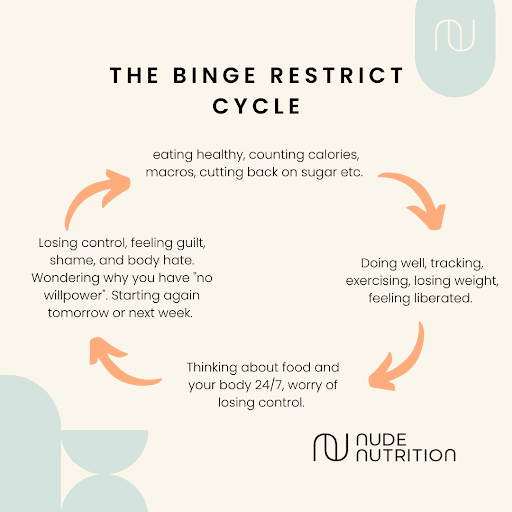
The only way to stop the cycle is to cut it off at the beginning. Allow yourself regular satisfying meals, but also allow yourself to eat ALL foods. No labels, no good or bad foods, because really, no food is morally good or bad. It’s all just food (unless you have an allergy, or clinical condition – of course, stick with your healthcare provider’s advice!).
One of the reasons having unconditional permission to eat is so important is because of the habituation response. Habituation refers to the way we quickly adapt to a repeated experience. Novelty and pleasure wane with exposure. This applies to many areas of life. For example, buying a new item of clothing. At first wearing, it might be very exciting, but it wears off over time. And so habituation also happens with eating food
Why not start by picking one “forbidden food” and do an experiment? Give yourself true permission to eat as much of it as you want, whenever you want, and see what happens.
5) Seek satisfaction at each eating occasion
As well as physically filling you up, your meals and snacks need to mentally and physically satisfy you so that you do not feel restricted (remember: restriction leads to deprivation and more thinking about food). This means choosing foods that we crave or that “hum” to us. To ensure physical satisfaction, I often talk about the importance of choosing options with “staying power” with my clients. These are usually those which include a source of each fat, protein, carbohydrate, and fibre.
6) Increase your coping toolbox
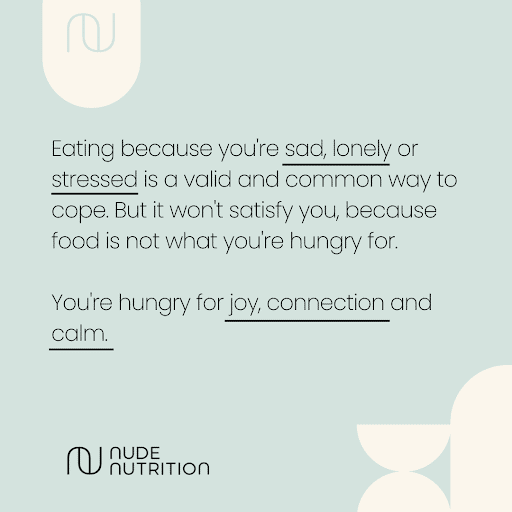
If you suspect that using food as a coping mechanism could be the main reason you can’t stop thinking about it, then learning other ways to cope with uncomfortable emotions will help. I have a whole article with tips on this that you can read here.
Stop Obsessing and Regain Control With Food: Your 7-day Guide
Practical, easy-to-implement tips to feel less obsessive and out-of-control around food.

Summary – How to stop thinking about food
In summary, the main reasons people tend to experience increased thoughts about food come down to dietary restrictions and emotions. Decrease unwanted food thoughts therefore may involve increasing the amount you’re eating, challenging rigid food rules, mindful eating and increasing your coping toolbox.
These different strategies are all part of the overall framework of Intuitive Eating. Intuitive Eating is an evidence-based approach to help improve your relationship with food, and have better self-control around food, so you don’t have to think about food all the time. Intuitive eating can help you learn to honour your health by listening and responding to the messages of your body. This helps you to meet your physical and mental needs based on your terms and move away from external diet tools such as the time of day, points systems, calorie tracking, rigid rules or meal plans – which can all exacerbate obsessive food thoughts. You can learn more about Intuitive Eating here.
Speaking to a Registered Dietitian or Therapist who specialises in Disordered eating can also help.. I run a private practice with a team of Dietitians and a Psychotherapist, to help you navigate healing your relationship with food. You can find out more about that here. and get in touch for a free 20-minute discovery call.


